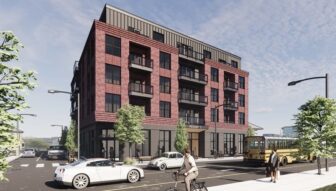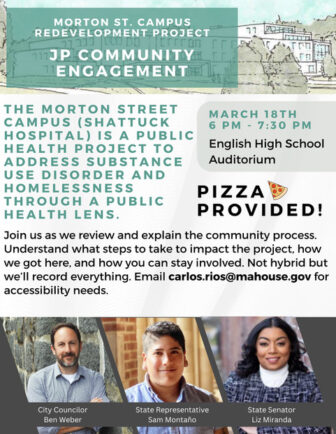Last updated on April 12, 2017

The Jamaica Plain Neighborhood Council (JPNC) Housing and Community Development Committee unanimously rejected the proposed 44-unit 3353 Washington St. rental development at its meeting last week.
The opposition point of view was summed up succinctly by committee member Pam Bender: “You are doing the bare minimum” for affordable housing and community benefits, she told developer Boston Community Ventures.
The May 10 meeting followed a contentious Small Project Review public meeting April 28 sponsored by the Boston Redevelopment Authority (BRA) at which neighbors expressed little love for the project, which would be located at the corner of Washington and Green streets across from the E-13 district police station.
The JPNC may register its own vote on the project at its meeting Tuesday, May 24.
Terry Bruce, representing developer Mordechai Levin, told attendees at the May 10 meeting that the project would provide six affordable units, as well as a roof garden, off-street parking and wider sidewalks.
Alan Benenfeld, a resident of nearby Union Avenue, urged Bruce to reveal the proposed rental costs for the units, a question she had declined to answer at the BRA hearing. After noting that the developer is two years away from construction and that the housing “is for middle-income families,” Bruce said that, with construction costs as they stand today, estimated rents would be:
One bedroom: $1,800 t0 $2,500 per month
Two bedrooms: $2,200 to $2,875 per month
Three bedrooms: $3,500 to $4,000 per month
The developer’s delay in initially revealing these figures drew critique. “You chose this meeting [as opposed to the BRA meeting] to disclose your costs. That shows a lack of respect,” said committee member Kyle Smith.
The rents themselves also stoked concerns from the crowd. Helen Matthews, who rents an apartment next to the proposed building site, aimed her opposition squarely at the proposed unit costs. “I am wholeheartedly offended by this project’s lack of affordability,” she said. She asked whether the developer had applied for tax credits, or whether it would set aside units for Section 8 voucher holders.
“We would have to investigate,” Bruce replied. “This is a lengthy process. We’ve never applied for it.”
Committee member Carolyn Royce considered how the proposed rents fit into the city’s definition of affordable housing. Individuals who make 70 percent of the city’s annual median income could comfortably rent a two-bedroom apartment for $1,540 a month, which tallies $18,580 a year for housing. At 3353 Washington St., however, “a one-bedroom market-rate unit at $1,800 a month means $21,600 [per year] for rent. That means, with all your other expenses, you’d have to earn about $70,000 a year to live there,” she said.

Another resident questioned whether the development would be family-friendly. “The units are too small. What demographics are you going for?” he asked, noting that many singles cannot afford to rent a one-bedroom unit so they take on roommates to fill three-bedroom apartments.
Committee member Red Burrows said he considered it “disingenuous of the developer to ignore the central part of the JP/Rox Plan of higher affordability and more community benefits.”
The five- to six-story height of the proposed building also continued to bother committee members and Union Avenue residents. The height, according to the Union Avenue Neighborhood Association, does not mesh with the existing fabric of their streets.
Jamey Lionette, in his final meeting as chair of the committee, called the proposal “luxury housing with a bare minimum of affordability. Appeasing wealthy people continues to be the attitude of the developer. They say the only way to [build] housing for regular people is to build for the wealthy income level, [but] that is simply not true.”
Lionette said the JPNC supports 25 percent project affordability, with those units targeted at households earning 55 percent of Boston’s annual median income, which is 10 percent below the city’s requirement. “I would be happy to see a tall building for regular people and not upper-class people,” he said, adding that he found it “a little offensive” that the development team did not yet have a plan for applying for tax credits for the project.
Bruce noted that increasing the percentage of affordable units leads to higher rents for the market-rate apartments. “We have to consider construction costs,” she said, adding that the project is “creating housing for moderate-income people. The inequality of the social system cannot be set at the feet of the developer.”
The BRA has extended the comment period for the project until Friday, June 17, and has scheduled a second Small Project Review meeting for Tuesday, June 7.







